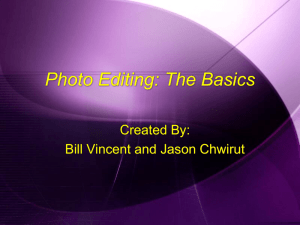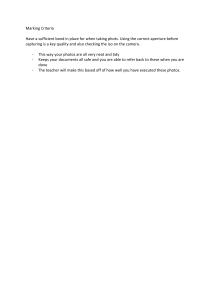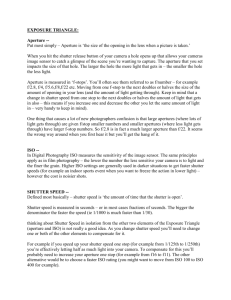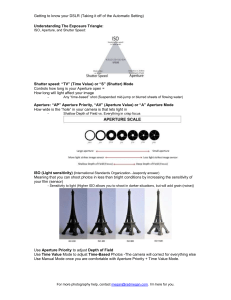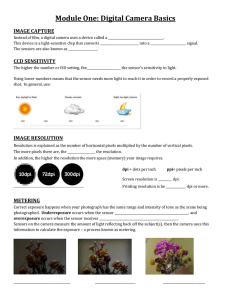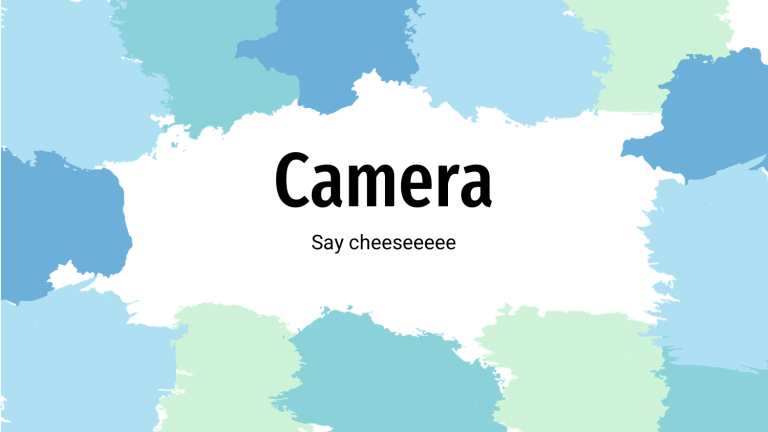
Camera Say cheeseeeee Know your camera 1 2 3 ISO Aperture Opening in a lens which light passes to enter the camera Shutter speed International Organization for Standardization The length of time the camera shutter is open Shutter speed = valve on the faucet If you use a shutter speed that is too long, too much light > picture too bright Shutter speed that’s too short, not enough light > picture will be too dark. Aperture = the size of the hose If you double the size of the aperture, twice as much light will get through to the sensor in the same amount of time ISO = the size of the bucket. If you lower your ISO from 200 to 100, it takes twice as much light to expose the photo, so you need to double the duration of the shutter speed or double the size of the aperture. There are lots of different ways to correctly expose a photograph, and since each way will also affect how the photo looks, choosing one way over another is part of the creative process. 1. ISO A camera setting To brighten or darken a photo How sensitive your digital sensor is to light Increase your ISO number Your photos will grow progressively brighter Too high ISO ISO will show a lot of grain, also known as noise, and might not be usable A common set for ISO • • • • • • • ISO 100 (low ISO) ISO 200 ISO 400 ISO 800 ISO 1600 ISO 3200 ISO 6400 (high ISO) 2. Aperture Definition Concept Iris The opening in a lens through which light passes to enter the camera Easy concept to understand if you just think about how your eyes work As you move between bright and dark environments, the iris in your eyes either expands or shrinks, controlling the size of your pupil ● In photography, the “pupil” of your lens is called aperture ● You can shrink or enlarge the size of the aperture to allow more or less light to reach your camera sensor ● Aperture can add dimension to your photos by controlling depth of field. ○ At one extreme, aperture gives you a blurred background with a beautiful shallow focus effect. ○ At the other, it will give you sharp photos from the nearby foreground to the distant horizon Aperture Size Exposure Depth of Field f/1.4 Very large Lets in a lot of light Very thin f/2.0 Large Half as much light as f/1.4 Thin f/2.8 Large Half as much light as f/2 Thin f/4.0 Moderate Half as much light as f/2.8 Moderately thin f/5.6 Moderate Half as much light as f/4 Moderate f/8.0 Moderate Half as much light as f/5.6 Moderately large f/11.0 Small Half as much light as f/8 Large f/16.0 Small Half as much light as f/11 Large f/22.0 Very small Half as much light as f/16 Very large 3. Shutter Speed Definition The length of time the camera shutter is open, exposing light onto the camera sensor Camera shutter Curtain in front of the camera sensor that stays closed until the camera fires Changing the brightness of your photo Shutter button Dramatic effects Triggers the shutter to open and close Either freezing action or blurring motion ● If your shutter speed is long, moving subjects in your photo will appear blurred along the direction of motion. ● This effect is used quite often in advertisements of cars and motorbikes, where a sense of speed and motion is communicated to the viewer by intentionally blurring the moving wheels.
